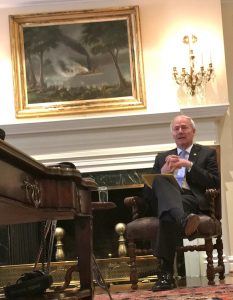Gov. Hutchinson: Victims’ families ‘they need closure’ (Updated)
by April 13, 2017 12:26 pm 739 views

Editor’s note: This story replaces the original shorter story.
–––––––––––––––––––––
One day after visiting the execution chamber at the Varner Supermax prison, Gov. Asa Hutchinson expressed confidence that the state’s upcoming executions will go off without a hitch.
He also told reporters at the Governor Mansion that he was more concerned about the victims of the “heinous murders” committed by the seven condemned killers on death-row than any public or international backlash from the state’s perceived rush to execute them.
“When you look at what we are going through here in Arkansas, you have to remember how this started,” Hutchinson said. “This started with a very heinous criminal act occurring that justified a prosecutor making a very serious decision to pursue capital murder charges.”
Hutchinson said that decision took place more than 25 years ago when convicted murderer Don Davis was sentenced to death. Since that time, the merits of the case have been reviewed multiple times by state and federal courts, he said, finally resulting in death penalty opponents challenging the method of execution over the past several years. After he was elected to the office of governor in early 2015, Hutchinson said he was faced with the decision to carry out his official duty to set the dates for the eight condemned prisoners.
“When I became governor, the courts had affirmed that method of execution and there were some challenges as you know, but this has been a very, very long process that has led us to the place we are today,” he said. “And there is a natural focus on those who are subject to the death penalty, and that’s understandable, but at the same time, there is insufficient attention that is claimed to the victim’s and their families in these cases.”
ACCOUNTS OF THE CRIMES
Hutchinson made those comments during a wide-ranging, relaxed pen-and-paper press conference with reporters at his official residence in downtown Little Rock as pressure mounts from across the globe for the governor and state prison officials to halt the speedy execution schedule that begins Monday at 7 p.m.
Perhaps the most poignant moment in the hour-long press event occurred when Hutchinson took nearly 10 minutes to read detailed descriptions of the murders committed by the eight death-row inmates, including Jason McGehee who was recommended for clemency earlier this month. At one point, Hutchinson took a moment to gather his emotions as he described one particularly horrific murder by inmate Jack Jones that involved the rape and murder of one victim and the beating of her child who begged for mercy.
“So those are facts we should remember, but also the history of how this began. It did not begin when I became governor, and it did not begin when I set the execution dates. It began nearly 25 years ago in most of these cases,” Hutchinson said after reading the accounts of each murder. “The victims’ families need closure.”

Hutchinson then took more than 45 minutes of questions from reporters about nearly every detail of his decision to carry out the executions, noting a visit he had on Wednesday with Department of Corrections Wendy Kelley and her staff at the Varner Unit Supermax in Lincoln County.
Hutchinson bristled at several questions on criticism of Arkansas officials of his perceived rush to originally execute eight prison inmates on four separate days from April 17 to April 27. He said after all the legal challenges had been exhausted, he was left with a decision on carrying out the executions as his duty as governor.
“I could have chosen to spread it out over four, 5 or 6 months if I chose to do so,” the governor said. “But you think about that, … would that have made any difference to death penalty opponents that are coming in here and protesting this? Would it have changed any of the circumstances or their view on this and made it more acceptable to them? I don’t think so.”
Hutchinson, an attorney by trade, also said he has taken extensive time away from other duties this month to study court documents and the controversial three-drug protocol Arkansas is using followed botched executions in Oklahoma, Alabama and other states. Specifically, Hutchinson said he studied the botched Clayton Lockett execution in Oklahoma, reading grand jury findings and a special report from that state’s corrections officials that detailed how the use of the sedative midazolam by the executioner led to what one Oklahoma corrections official called a “bloody mess.”
“It was clear to me, there were a lot of problems, and I learned from it,” the governor said. “I will try to do what I can to make sure we do it right. I have great confidence in director Wendy Kelley and her staff there that are experienced in handling this.”
Hutchinson, however, would not offer details of conversations he has had with Kelley and the ADC staff about execution protocol. He said he would communicate with the ADC staff during each of the executions, offering his guidance either from the Governor’s Mansion or the State Capitol.
‘RESPONSIBILITY TO A HIGHER POWER’
Hutchinson said he does feel the “weight” of his decision to set the execution date for the seven prison inmates – the state’s first visit to the death chamber since 2005. Hutchinson said he has set aside several events on his calendar this month so he could take time to weigh each decision concerning the executions.
“This is something that is in my radar of responsibilities, and it is not something that any governor seeks or wants, but it comes with the job,” he said.
Hutchinson added: “There has only been one thing on my mind in the month of April. Whenever you are governor, that takes away from a lot of things, but it is necessary. I would say that this is … the heaviest and most serious responsibility that I will probably ever have as governor.”
Noting that he has spoken to faith leaders, including those with different opinions than his own, Hutchinson said there are different religious views on the subject, different biblical standards and “there are God’s standards.”
“I have a responsibility to voters. I have a responsibility to an oath of office and I have a responsibility to a higher power – God and Eternity. And I understand that,” said Hutchinson.
Hutchinson also said future executions could run into problems because the supply of execution drugs is “unknown.” He said Arkansas and other states may have to consider other options on the method of executions.
FEDERAL RULING PENDING
As the governor prepares for the upcoming executions, U.S. District Judge Kristine Baker is expected wrap-up testimony in a federal hearing Thursday (April 13) by 8 p.m. to decide whether to rule on a request by inmates’ attorneys to halt the executions on the grounds that the state’s timetable is unconstitutional and fraught with unforeseen risk.
Baker has said not said when she plans to rule, but attorneys for both sides say they expect some type of decision before the executions take place after the Easter weekend. The federal judge, who was appointed by former President Barack Obama to the Eastern District of Arkansas, has heard four days of testimony from out-of-state witnesses and experts on the merits of the three-drug protocol that the ADC officials plans to use to put the seven inmates to death. In addition, attorneys for Bruce Ward and Don Davis, who are both scheduled for execution on Monday, April 17, filed a motion to stay the executions Wednesday with the Arkansas Supreme Court, pending the outcome of the U.S. Supreme Court case, McWilliams v. Dunn. T.
The motion states, in part, that when a defendant’s mental state is likely to be at issue, “the state must, at a minimum, assure the defendant access to a competent psychiatrist who will conduct an appropriate examination and assist in evaluation, preparation, and presentation of the defense.” Attorneys for Ward and Davis said the condemned Arkansas prisoners have been denied this right. They said Ward has a life-long history of severe mental illness, including paranoid schizophrenia, delusions and breaks with reality. Davis’ attorney says he has an IQ in the range of intellectual disability, as well as ADHD and psychoactive substance abuse disorders.
“To execute Don Davis or Bruce Ward before that question is answered would deeply offend the integrity of the judicial process,” the court filing states.
Gov. Hutchinson had originally set four execution dates from April 17 through April 27 for eight Arkansas inmates on death row whose appeals have been exhausted and whose cases the U.S. Supreme Court declined to review in late February. All of the condemned men have been convicted in Arkansas for capital murder, with some death row proponents pointing out that the upcoming executions will give some comfort to the victims’ families who have waited years for justice.
